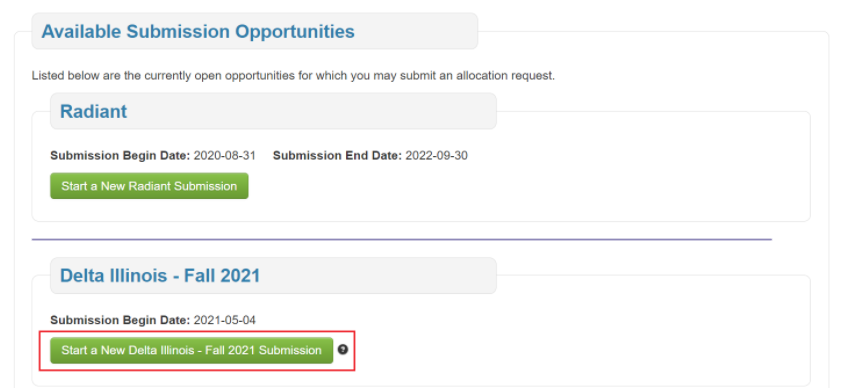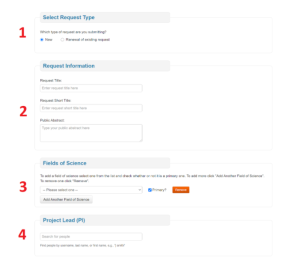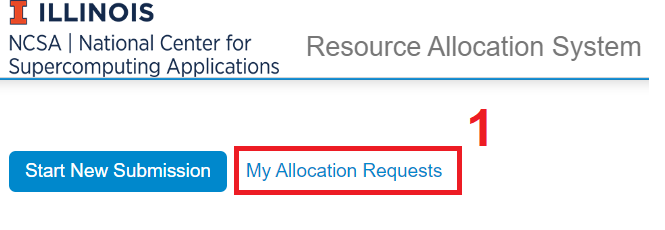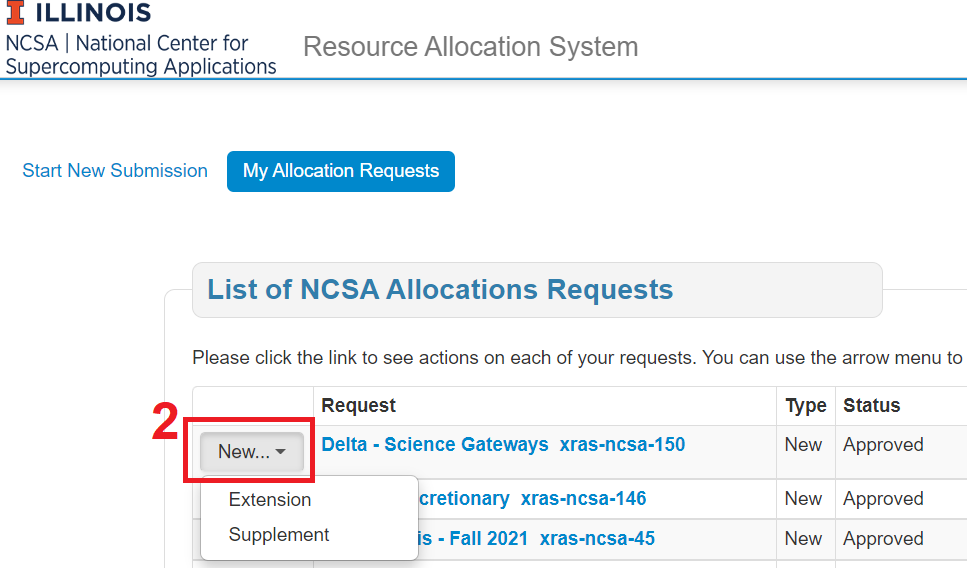Types of Delta Allocations
Delta Allocation Type | % of System | Description |
ACCESS | 90% | |
Illinois | 5% | University of Illinois faculty and researchers |
Discretionary | 2% | PI's discretion - Innovative/Exploratory allocations |
Diversity | 1% | EPSCoR, MSI, and HBCUs |
Science Gateways | 1% | For integrating/partnering Delta science gateways (most gateway allocations will go through XSEDE) |
Data Science | 1% | Data Science research projects; could lump in with Illinois as a special category, but may need to open to others |
Delta - ACCESS Allocations
90% of the Delta system is allocated through the ACCESS program.
To get started with ACCESS allocations, see the Get Started ACCESS Allocations page on the ACCESS website.
ACCESS resources are allocated on an ongoing basis through Explore, Discover, and Accelerate allocations, and periodically through Maximize allocations.
Delta - Illinois Allocations
5% of the Delta system is allocated to Illinois faculty researchers during biannual allocation periods.
To get started with Illinois allocations, request an NCSA Kerberos account at this link. Account creation may take up to 24 hours once requested.
Once your user account has been created, you can submit proposals for open Illinois allocation requests by visiting the NCSA XRAS Submit portal.
The table below contains upcoming/recent periodic allocation requests periods for Illinois users. For a complete list of available resources, view the NCSA Resources section below.
| Open Resource Allocations | Open Request Period | Access |
|---|---|---|
Delta Illinois | 9/15/22 - 10/31/22 | Allocation awarded by NCSA to University of Illinois Urbana campus researchers |
Submitting your Delta Proposal for a new project allocation
NOTE: Step 1 may take up to 24 hours, please plan accordingly based on the deadline for submission.
- Create an NCSA Kerberos account at this link. Account creation may take up to 24 hours once requested, please plan accordingly.
- Once your NCSA Kerberos account is created, follow this link to go directly to the XRAS submission portal.
- Select the appropriate Delta opportunity for your request (See image below)
- "Start a New Delta Illinois Submission."
- "Start a New Delta Discretionary Submission."
- Select the appropriate Delta opportunity for your request (See image below)
3. Complete your submission
- Select “New” request.
- Add a title and abstract for your submission.
- Select the relevant fields of science.
- One person must be designated as the Principal Investigator (PI) for the request. Other individuals can be added as co-PIs or Users (but they must have NCSA Kerberos accounts).
- Provide the data required by the form. Fields marked with a red asterisk are required to complete a submission. (See images below)
- Enter any supporting agency awards, as applicable.
- Under Available Resources, select the appropriate resources and indicate the requested amount of each.
- In the Documents section, select "Add Document" and upload any supporting documents.
- Only PDF files can be accepted.
- If you do not wish to submit any supporting documents: Select the orange "Remove" button and any documents indicated as required (*with a red asterisk) will no longer be required for form submission.
- At the bottom of the page, select "Submit." If necessary, correct any errors and submit the request again.
Requesting an extension or supplement for an existing Delta project allocation
- Follow this link to go directly to the XRAS submission portal.
- Click the "My Allocation Requests" link (see image below)
- Find the project you would like to request an extension or supplement for in the "List of NCSA Allocation Requests" table
- Using the dropdown menu next to that request, select Extension or Supplement (see image below)
- Fill out the form to request an Extension or a Supplement
Policies & Submissions Guideline Recommendations
- Start-up allocations may be requested for test runs and to determine full allocation request needs; up to 1,000 gpu hours, 50,000 core hours
- The maximum allocation will be about 1/10th of the total so ~25k GPU hours and 690k CPU core hours
- Research teams are responsible to manage their own export control needs
- All allocations such as Blue Waters allocations will end with Blue Waters and will not carry over to Delta
- Illinois allocations should be for research only; recommend using XSEDE education allocation process if resources are needed for instruction
- There will be two periodic allocation periods open per year with year-long allocation award opportunities normally occurring April/May and January/February
- Delta will allocate the CPU and GPU resources separately with the emphasis being on the GPU resources with the expectation that most allocations will be primarily a GPU allocation with a smaller supporting CPU allocation.
- The Delta compute elements are more powerful than the Blue Waters compute units with the Delta CPU nodes offering ~6X faster performance and the A100 GPU offering 15X performance improvement. On a performance basis the Delta Illinois allocation offers the same or better performance than 10% of the Blue Waters GPU nodes, but less than 5% of the CPU capability. The smaller storage pool will also limit Delta’s use for the extended storage of large data sets, though the performance of Delta’s flash based storage will provide much faster throughput for some workloads.
- Illinois allocation requests should be significantly different from requests by the same user for discretionary requests or have a strong reason (e.g., proposal opportunity, disaster response, etc.). Discretionary usage should be utilized before an additional Illinois request is made.
- Eligibility: Faculty or staff for whom the University of Illinois at Urbana-Champaign is their home institution by primary appointment affiliation are eligible to submit an Illinois allocation proposal as Principal Investigator. This includes postdoctoral fellows or postdoctoral research associates. Registered graduate or undergraduate students are not eligible to apply as Principal Investigators due to administrative requirements regarding appointment status but are encouraged to apply if their faculty or staff advisor will agree to be Principal Investigator on the proposal. Visiting faculty or external adjunct faculty for whom Illinois is not their primary home institution are eligible to apply as Principal Investigators if, for the period covered by the proposal request: i) Illinois will be their primary (majority) place of residence; and: ii) and they will hold appointments at Illinois during this period. All proposals can include co-PIs and collaborators from other institutions.
- Allocation Definitions:
- Supplements -- Supplement requests can be submitted up until 30 days remain on the current allocation. If a PI has less than 30 days remaining on their allocation but is in need of a supplement, they must typically first submit and be approved for a time extension. When a Startup or Research supplement is submitted, it is automatically assigned for review to the SP(s) requested. After the SPs have completed their reviews, the allocations staff will process (approve or reject) the supplement request and notify the PI through XRAS.
- Extensions -- Extensions are strongly discouraged. If deemed necessary, a time extension can be submitted when less than 90 days remain on the allocation and up to 90 days after the expiration of the allocation. Currently two options are available when requesting a time extension: 3 months or 6 months. This constraint ensures that Research awards remain aligned with future Research opportunities. Once an extension is submitted, an XSEDE Allocations Practices and Procedures Page 27 allocations staff member assigns the extension request to the SP representative(s) responsible for reviewing their resources. The SP enters a review with their decision, and once all sites have agreed on a decision, the allocations staff member processes the extension and notifies the PI through XRAS.
- Final Reports -- guidance TBD; final reports are required for NSF reporting purposes and allocations could be arranged to not be made unless users are in good standing with previous final report submission




